By Frank Newport and Glynn Wilson –
As New Hampshire takes over in the national spotlight this week as the presidential candidates focus on next Tuesday’s primary, Gallup released its latest survey showing the least and most religious states in the country. New Hampshire now tops the list as the least religious state, followed closely by Bernie Sanders’ home state of Vermont, while Mississippi has extended its eight-year streak as the most religious state, followed closely by neighboring Alabama.
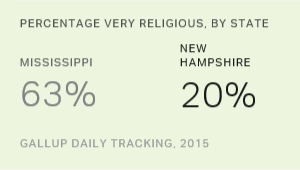
The other eight states that make the top 10 list of least religious states include Maine, Massachusetts, Oregon, Washington, Hawaii, Rhode Island, New York, Alaska and Wyoming.
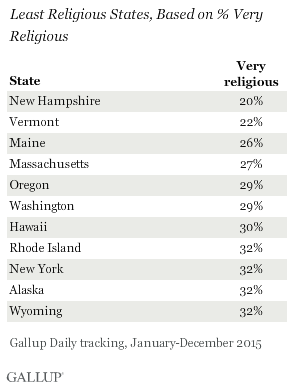
The other eight states that make the top 10 most religious states are Utah, Louisiana, Tennessee, Arkansas, Georgia, South Carolina, North Carolina, Kentucky and Texas.
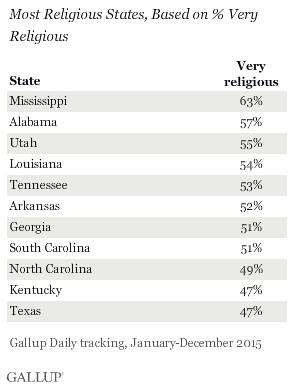
According to entrance polls of Iowa caucus voters, Ted Cruz’s win in the Republican caucus on Feb. 1 in Iowa was driven by his strong appeal to highly religious people and evangelical Republicans, according to Gallup, who turned out in large numbers.
“Although Iowa as a state has only average religiosity, it is still significantly more religious than New Hampshire, suggesting that Cruz will have fewer evangelicals to bring out to vote in that state’s (upcoming) primary,” Gallup says.
Other polls show Donald Trump leading in the New Hampshire Republican primary by a range of 13 to 21 points, and Bernie Sanders leading Hillary Clinton by a range of 4 to 15 points.
The next contest in the Republican campaign, the South Carolina primary own Feb. 20, will take place in the nation’s seventh most religious state, a state with far more African Americans than either Iowa or New Hampshire. There, polls show Trump leading in the Republican primary by a range of 14 to 19 percent, and Hillary Clinton leading in the Democratic primary by a range of 22 to 37 percent.
Gallup has long been interested in tracking the ups and downs of religion in America, and classifies American citizens into three religious groups based on their responses to a question measuring religious service attendance and how important religion is in their daily lives. Very religious Americans are those who say religion is important to them and who attend services every week or almost every week. Nonreligious Americans are those for whom religion is not important and who seldom or never attend religious services. Moderately religious Americans meet just one of the criteria, either saying religion is important or that they attend services almost every week or more.
Gallup began tracking several religious indicators on a daily basis in 2008. Some of these indicators have shown significant change over time, most notably the percentage of Americans who report no formal religious identity. Also church attendance in the U.S. has been falling steadily for decades. In 2015, 40 percent of Americans say they are very religious, 29 percent come in as moderately religious and 31 percent were totally nonreligious, nearly a third of the American people.
Implications
“There are many explanations for the variations in religiosity by state, including the historical and cultural norms and patterns of each state, the types of people who choose to migrate to specific states and, to some degree, the demographic composition of the states,” Gallup says.
Religion is significantly linked to politics, with Republicans significantly more religious on average than Democrats, so it’s predictable that more religious states tend to vote Republican.
There are exceptions, however. Louisiana, Georgia, North Carolina and Kentucky are among the most religious states but are classified as politically competitive based on their party identification, according to Gallup. Alaska is one of the least religious states in the union, but is classified as solid Republican. New Hampshire is the least religious state in the country, yet is classified as a Republican leaning state by Gallup, while other research firms call it a swing state.
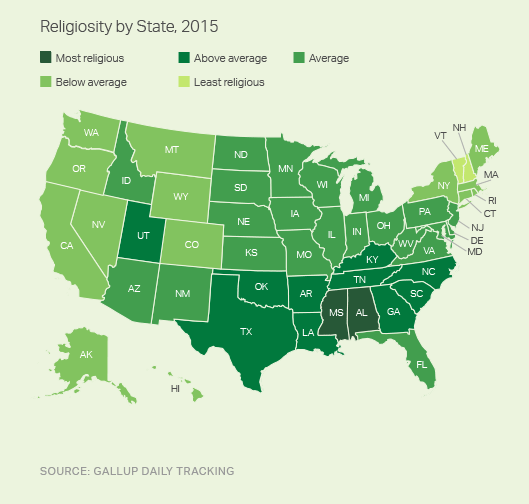
Survey Methods
Results for this Gallup poll are based on telephone interviews conducted Jan. 1-Dec. 31, 2015, on the Gallup U.S. Daily survey, with a random sample of 174,745 adults, aged 18 and older, living in all 50 U.S. states and the District of Columbia. For results based on the total sample of national adults, the margin of sampling error is plus or minus 1 percentage point at the 95 percent confidence level.
Margins of error for individual states are no greater than plus or minus 6 percentage points and are plus or minus 3 percentage points in most states. All reported margins of sampling error include computed design effects for weighting. Each sample of national adults includes a minimum quota of 60 percent cellphone respondents and 40 percent landline respondents, with additional minimum quotas by time zone within region. Landline and cellular telephone numbers are selected using random-digit-dial methods.







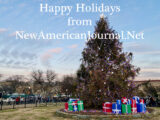






Looks like a complete over-hall of the primary system should definitely be on the front burner. A caucus primary (where only a relative handful of the state’s eligible voters participate), held ahead of the state’s regular General Election primary in a heavily evangelical Iowa, followed eight days later by a normal primary election in the country’s least-religious state of New Hampshire, just has to be somebody’s idea of a huge practical joke on both the entire election process and every single registered voter in the 50 United States of America. Petition for change, anyone?